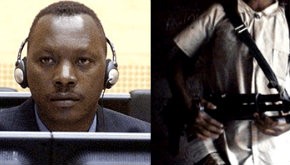The end of impunity? The International Criminal Court issues a verdict: The International Criminal Court issues a verdict

Ten years after it was founded, the International Criminal Court has issued its first decision. On March 14, the ICC—the world’s first permanent tribunal with jurisdiction over war crimes, crimes against humanity and genocide—found Congolese warlord Thomas Lubanga guilty of recruiting and enlisting child soldiers. He forced children as young as 11 to pick up guns and aid in ethnic cleansing in the Democratic Republic of Congo in 2002–2003.
The landmark decision has been hailed as a victory for the protection of children in armed conflict and praised for its strong message to perpetrators that violations of international law will no longer go unpunished. Estonian diplomat Tiina Intelmann, the president of the Assembly of States Parties which established the ICC, declared, “We have left the age of impunity behind us and entered the age of accountability.”
Read our latest issue or browse back issues.
For the past half-century, human rights advocates have struggled to find adequate mechanisms to punish the most serious crimes of international concern. National courts are supposed to enforce the Geneva Conventions and other humanitarian laws, but these courts are often unable or unwilling to prosecute crimes committed by high-ranking state officials. To combat impunity in these settings, the international community has periodically established ad hoc tribunals. In the aftermath of World War II, the Allied Powers set up tribunals at Nuremberg and Tokyo to prosecute Nazi and Japanese war criminals. More recently, the United Nations Security Council created international tribunals to address crimes committed in Rwanda, the former Yugoslavia and Sierra Leone. It was the Special Court for Sierra Leone that in May sentenced former Liberian president Charles Taylor to 50 years in prison.
These courts introduced important precedents such as individual criminal responsibility for international crimes, but they were partial solutions since they could only investigate crimes in specific conflicts. In the cases of Nuremberg, Tokyo and Rwanda, they punished crimes on only one side of the conflict. These limitations pointed to the need for a permanent court that could impartially investigate crimes committed anywhere in the world with the authority of the international community as a whole.
Efforts to establish such a court culminated in July 1998 when 120 nations signed the Rome Statute, the legal basis for the ICC. The statute went into force four years later when 60 nations ratified the treaty. Designed as a court of last resort, the ICC prosecutes cases only when countries are unable to do so. State parties may refer cases to the ICC and the UN Security Council can also recommend cases to the prosecutor.
The ICC has issued 19 warrants across seven countries, but without a police force, it has struggled to bring cases to trial. In 2005 it issued its first arrest warrants for members of the Lord’s Resistance Army, a rebel group responsible for numerous atrocities during its rebellion against the Ugandan government. Eluding the Ugandan military, the four LRA suspects—including its leader, Joseph Kony, the subject of the much-discussed Invisible Children video that went viral recently—remain at large in the Central African Republic. In 2009 the ICC made headlines by issuing its first warrant for an acting head of state, Omar al-Bashir, the president of Sudan. Wanted for genocide and crimes against humanity in Darfur, al-Bashir will face trial only in the unlikely event that a neighboring state arrests him.
In the meantime, the court has tried to build momentum through cases in which governments have been more cooperative. For the past decade, the Democratic Republic of Congo has been ravaged by a brutal war that has cost millions of lives and devastated nearly every level of society. During the conflict, neighboring countries such as Rwanda and Uganda plundered Congo’s vast mineral wealth and armed a number of rebel groups, which remained active after the war formally ended. Lubanga led one of these groups, the Union of Congolese Patriots, and terrorized the Ituri region of northeastern Congo in 2002 and 2003. The Congolese government eventually arrested him and transferred his case, along with two others, to The Hague.
In Ituri, reaction to the verdict has been mixed. On the one hand, many Congolese express satisfaction that a warlord is finally being held accountable; they believe that this decision will help deter future criminals. “The ICC’s verdict is a lesson for people pursuing the politics of war in this country,” said Jean-Luc Simbiliabo, a resident who was displaced during the conflict. “Other militia leaders will now be afraid of being arrested for their crimes.”
But other Congolese complain that the ICC has been selective in its charges against Lubanga. While Lubanga was linked to numerous atrocities across the region, including mass killings, displacement and sexual violence, the court limited its case to the recruitment of child soldiers. Mike Upio, director of the Centre Médicale Évangélique in Nyankunde, remarked, “Using children and conducting this military operation against the ordinary people led to massacres. We lost many of our relatives and friends. But the ICC focused on the children and left the killings out of its investigation.”
Others have questioned the court’s focus on Lubanga while ignoring those in Uganda and Rwanda who funded and supported him. Kalisa Eliakim, a field assistant for Samaritan’s Purse, wonders why more rebel leaders have not been prosecuted, observing, “I have trouble supporting the verdict because the ICC does not appear to be impartial. Victims find that perpetrators of the same crimes in Ituri are free and now working with the government while only some are judged.” He points to the case of Bosco Ntaganda, who has been wanted by the ICC for recruiting child soldiers but has been integrated into the Congolese army and promoted to the rank of general.
In response to such criticisms, the ICC’s chief prosecutor has recently stepped up efforts to bring Ntaganda to justice, announcing that he will seek new charges of murder, ethnic persecution, sexual slavery and attacks on civilians. Moreover the Congolese government, which had previously refused to arrest Ntaganda, has indicated its willingness to put him on trial. In a country in which so many perpetrators have been integrated into the government, however, local expectations of justice will not be satisfied until others are held responsible.
Concerns about bias extend to the ICC’s approach more broadly. Since its inception, it has only investigated situations in Africa, leading many to conclude that the court is imposing a neocolonial agenda on the continent. To many observers, the ICC’s talk of universality and accountability rings hollow when they see the war crimes of Western leaders go unpunished. The United States—like Iran, Russia and China—has refused to ratify the Rome Statute and is not subject to its jurisdiction.
Katho Bungishabako, a biblical scholar and president of Shalom University of Bunia, acknowledges these shortcomings but sees the ICC’s conviction of Lubanga as the beginning of a longer process: “I know people are criticizing the ICC saying it is only for Africans, not for Americans, but for me, with the experiences we’ve had and everything we’ve been through, I think it is a beginning. We live in a region that is highly unstable. Even now we’re hearing about the formation of two new militias nearby. The Lubanga decision says that they can start, but they’ll end up like him. We need the process to continue for others.”
Lubanga’s sentencing hearing will take place on June 13, and the prosecutor has said he will seek close to the maximum sentence of 30 years (the ICC cannot impose the death penalty, but it could impose a life sentence).
Eager to deflect the criticism that it is putting Africa on trial, the ICC will likely turn its attention to other parts of the world, including Colombia and the Middle East. While it appears that the ICC will remain committed to prosecuting high-profile cases in the Congo, the burden of dealing with other war-related crimes will fall to Congo itself.
The Lubanga decision is undoubtedly a high-water mark in the enforcement of international law, but it is also a sobering reminder of how far the ICC has to go. If the court is just beginning to experience success in combating impunity among the leaders of small rebel groups, it will face an even greater challenge in trying to hold more powerful leaders accountable. After a decade of existence, the ICC’s shortcomings have stirred a longing for a more genuinely international effort to prevent and punish the worst crimes, regardless of where they are committed.





